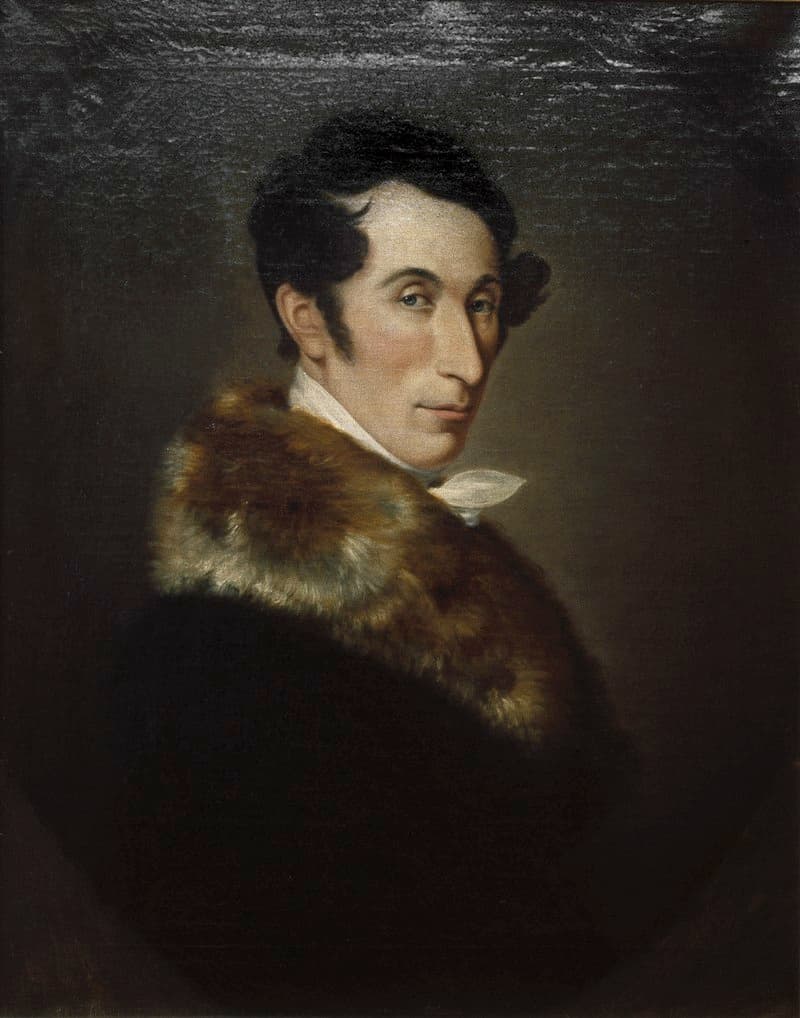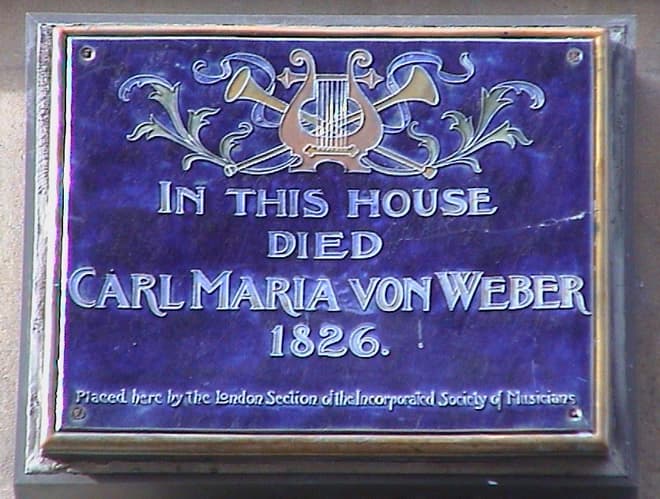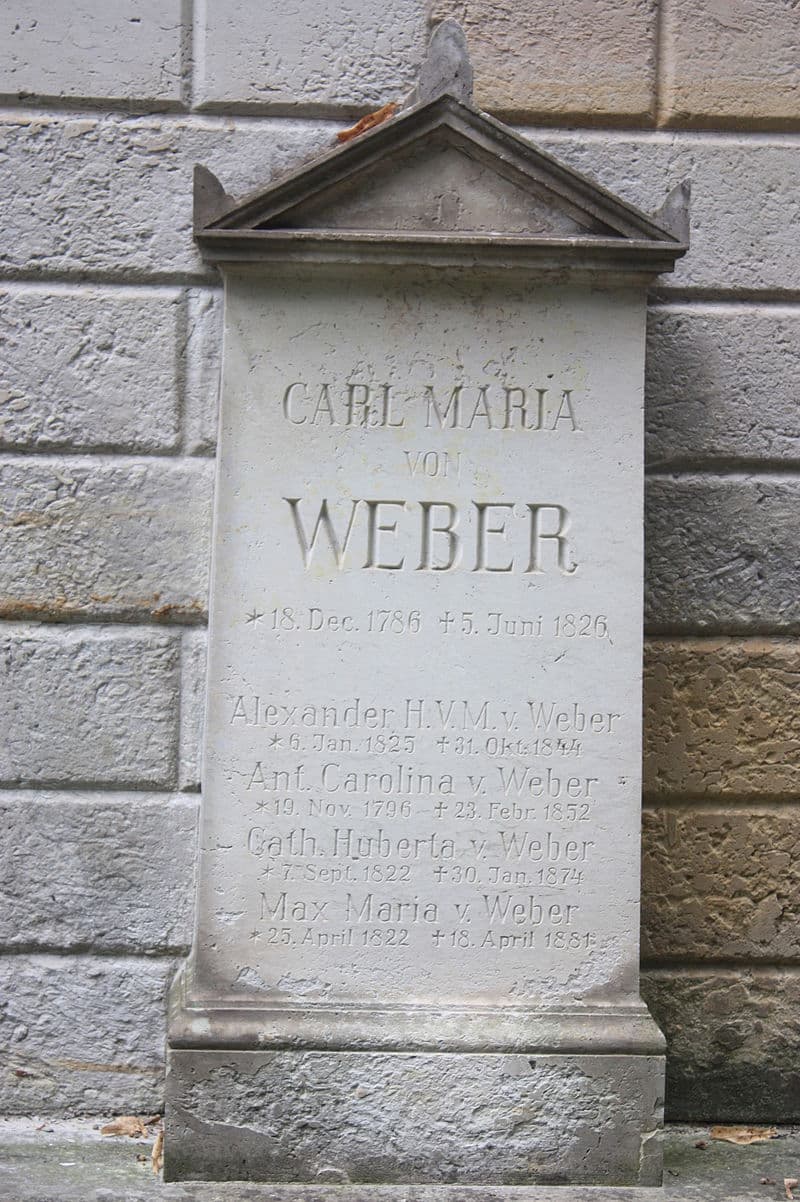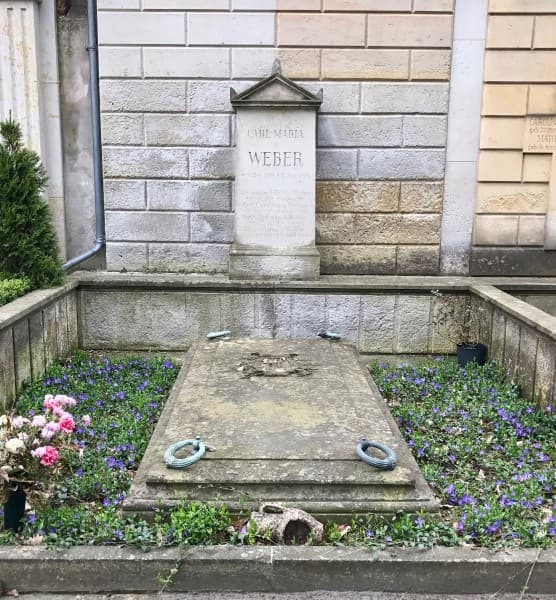A veritable mania for Carl Maria von Weber’s (1786-1826) opera Der Freischütz swept London in 1824. Despite suffering from the advanced effects of tuberculosis, Weber accepted an offer from the impresario Charles Kemble to conduct the opera season and compose two new operas for Covent Garden.

Portrait of Carl Maria von Weber, 1825
Going against the explicit instructions from his doctors, Weber did accept the commission and arrived in London on 5 March 1826. He conducted the premiere of Oberon on 12 April and was looking towards a performance of Freischütz on 5 June. However, his health steadily deteriorated and Weber died, at the age of 39, in his sleep during the night of 4-5 June 1826. Weber had been staying in the home of his good friend and host Sir George Smart, and the body was discovered about ten to seven in the morning, as the door was forced open. “A doctor was summoned to open a vein, but hardly had he raised Weber’s hand than he let it fall, explaining that it was all useless as the man had been dead for five or six hours. In the afternoon a post-mortem was held, and a medical certificate was issued.
Carl Maria von Weber: Der Freischütz, “Durch die Wälder, durch die Auen”
The medical examiner wrote, “On examining the body of C.M. Weber we found an ulcer on the left side of the larynx, the lungs almost universally diseased, filled with tubercles, of which many were in a state of suppuration with two vomicae one of them about the size of a common egg, the other smaller. Either of which was quite sufficient to cause his death.”

Commemorative plaque of Carl Maria von Weber in London
Weber’s body was embalmed and placed into a lead coffin, which was sealed. A biographer reports, “The news of his death spread rapidly, and musical London united in sorrow.” A number of commemorative concerts were given, and plans were underway to perform the Mozart Requiem in aid of a memorial to Weber. However, there was plenty of anti-German sentiment afoot, and “the Roman Catholic Bishop refused to give his consent for admission to be charged, and the Dean and Chapter of St. Paul would not tolerate a Catholic Requiem in the Cathedral.”
Carl Maria von Weber: Oberon, “Overture”
On 21 June, a grand funeral procession started from Great Portland Street and headed to the Roman Catholic chapel of St Mary Moorfield. “All the leading singers in London, headed by Lablache, offered their service for the occasion, and to the strains of Mozart’s Requiem, Weber’s mortal remains were interred in the vault.”

The grave of Carl Maria von Weber, Old Catholic Cemetery, Dresden
14 years after Weber’s death, a Frenchman in London tried to locate his coffin in Moorfield. With the help of two choirboys, he finally discovered it, and he published an appeal in the Gazette Musicale de Paris on 21 January 1841, bemoaning the state of affairs. When an additional article appeared in the Europa magazine, a committee was formed in Dresden urging the return of Weber’s remains to German soil. However, “there were objections, particularly from the Saxon court, who solemnly suggested that the precedent of returning all dead Kapellmeisters to Dresden might prove an awkward one.” Finally, on 25 October 1844, thanks in part to the efforts of Richard Wagner, Weber’s coffin arrived in Hamburg.
Carl Maria von Weber: 10 Scottish Songs, No. 7 “John Anderson” (arr. Weber) (Scottish Early Music Consort; Christopher Field, cond.)

Grave of Carl Maria von Weber
The Funeral March from the Eroica Symphony sounded as the body was transferred to a small boat for its journey up the Elbe. The boat got stuck, and Weber’s final journey was taken by train, arriving in Dresden on 14 December. The procession accompanied by the “Overture” and “Cavatina” from Euryanthe arranged for wind instruments by Wagner, moved to the Catholic cemetery. The coffin was interred the next day, with Wagner making a speech. In his autobiography, he later wrote, “I had learned to love music by way of my admiration of Weber’s genius, and the news of his death came as a terrible blow to me. To have come in contact with him again, so to speak, and after so many years by this second funeral, was an event that stirred me to the very depths of my being.” To be sure, Weber’s music was incredibly popular with the general public as he sought to tell stories in his music that could be understood by everybody. However, he also influenced composers as diverse and aloof as Marschner, Mendelssohn, Wagner, Meyerbeer, Berlioz, and Liszt.
For more of the best in classical music, sign up for our E-Newsletter
